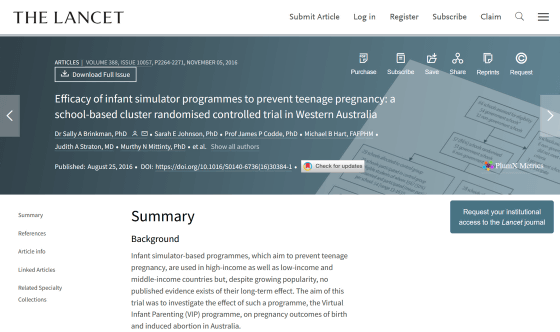A case where the number of women who became pregnant in their teens increased when they introduced a ``childcare simulation program'' to prevent pregnancy in their teens

In some countries and regions, in order to prevent pregnancy and childbirth in the teens, 'baby simulation programs' are provided as part of sex education programs to simulate child-rearing. However, in a paper published in 2016, research results have been reported that these programs have conversely increased the number of women who become pregnant in their teens.
Efficacy of infant simulator programs to prevent teenage pregnancy: a school-based cluster randomized controlled trial in Western Australia - The Lancet

Electronic baby simulators could increase, not decrease, teen pregnancy
https://theconversation.com/electronic-baby-simulators-could-increase-not-decrease-teen-pregnancy-64431
Baby simulators not effective in preventing pregnancies, study says | CNN
https://edition.cnn.com/2016/08/30/health/baby-simulator-teenage-pregnancy/index.html
An Australian research team assigned girls aged 13 to 15 attending 57 schools in Western Australia to a group that participated in a baby simulation program and a group that attended a regular pregnancy prevention curriculum. We conducted a study that followed up to . The program was implemented from 2003 to 2006, 1267 of the 2834 participants participated in the baby simulation program, and the remaining 1567 participated in the standard school education curriculum.
In the baby simulation program, in addition to an educational program using workbooks and documentary viewing, on the weekends, a 'baby robot' was used to simulate baby care. The subject had to perform tasks such as taking care of breastfeeding and burping, putting him to sleep, and changing diapers against the baby robot.
The goal of the baby simulation program was to help girls realize how hard parenting can be and discourage unintentional pregnancies. The workbook also included sessions on the financial costs and health issues of having a baby, and the documentary focused on teenage mothers.

However, when the participants' medical records were followed for six years up to age 20, about 11% of the girls who participated in the standard pregnancy prevention program became pregnant, compared with about 11% of the girls who participated in the baby simulation program. 17% turned out to be pregnant. Far from preventing teenage pregnancies, baby simulation programs have been shown to increase the chances of them becoming pregnant.
More than 60% of girls who participated in standard pregnancy prevention programs chose to have an abortion, compared with less than 50% of girls who participated in baby simulation programs. The results showed that about 8% of girls who participated in a baby simulation program had a baby in their teenage years and were twice as likely to become mothers in their teenage years compared to 4% of controls. Ta.
A set of data included the girl's socioeconomic status and family composition, sexual experience prior to attending the program, previous experience caring for a baby, level of psychological distress, tobacco and alcohol habits, and educational level. Even when re-analyzed taking into account, there was still a clear difference between the two groups.
``This is definitely more than

Although the study did not include a questionnaire survey of pregnant subjects, Brinkman speculated that girls who received support and positive responses from their families in the baby simulation program were ``able to raise a baby on their own.'' 'There is a possibility that I was confident.
Heather Lowe, a researcher at
One of the reviewers of the paper, Dr Julie Quinlivan of the University of Notre Dame Australia , told CNN that the root cause of teenage pregnancies is social, psychological and educational disadvantages. I'm talking “Future research should look at strategies that promote improved access to education for vulnerable girls as a strategy to reduce teenage pregnancies,” Quinlivan said. 'The more educational opportunities we give them, the more likely they are to find employment and improve health care for themselves and their children, and the less likely they are to view premature parenting as a 'career path.'' said.

Related Posts:
in Science, Posted by log1h_ik







